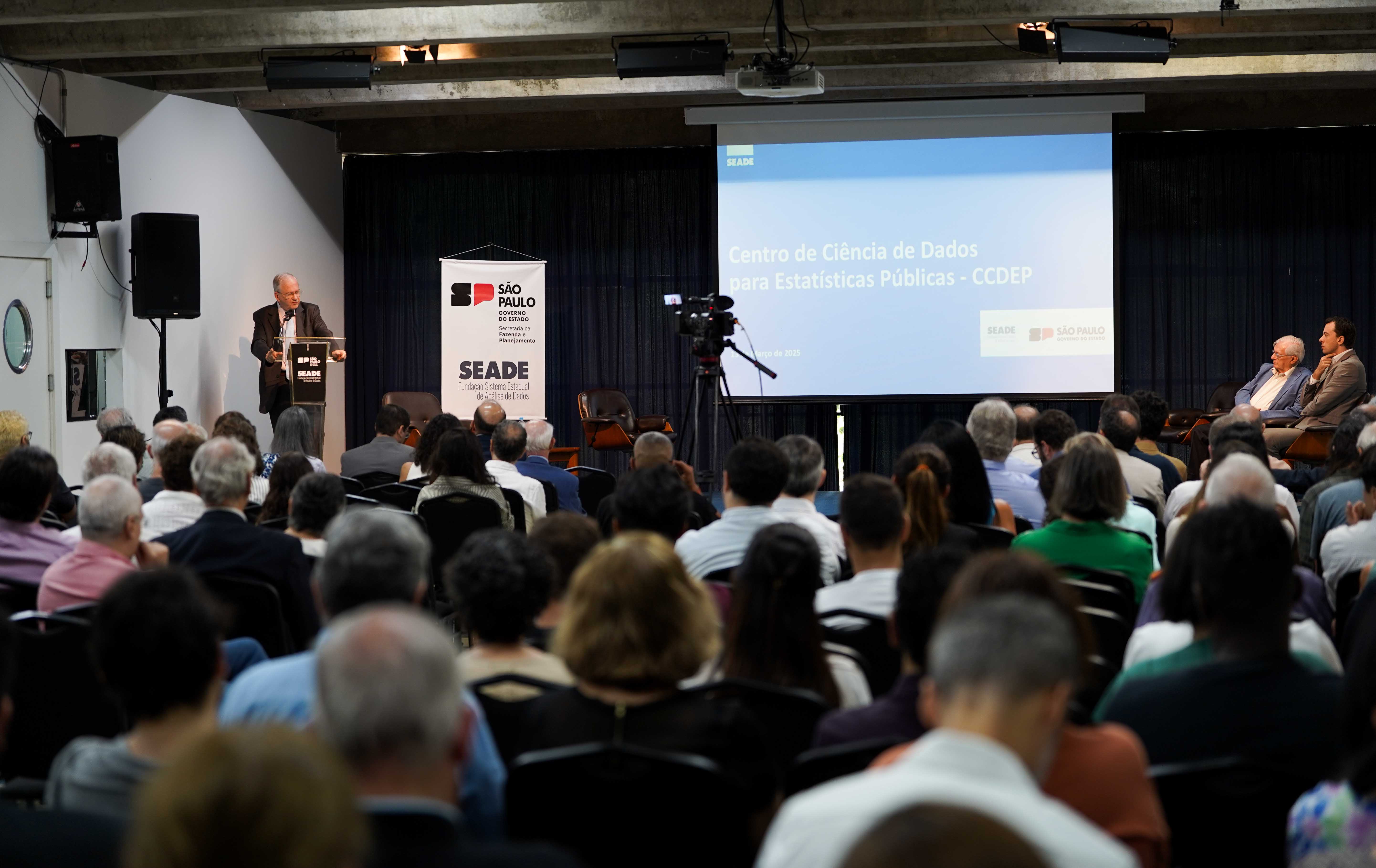


The inauguration took place on March 13th at the SEADE Foundation (photo: Daniel Antônio/Agência FAPESP)
Published on 04/25/2025
By José Tadeu Arantes | Agência FAPESP – The Data Science Center for Public Statistics (CCDEP) will incorporate big data, machine learning and artificial intelligence to meet the needs of public management in the state of São Paulo. Inaugurated on March 13th, the new center, based at the SEADE (State Data Analysis System) Foundation in the University São Paulo’s main campus, is supported by FAPESP through the Science Centers for Development program (CCD, in the Portuguese-language acronym).
“The CCDEP was born out of the need to deal with the growing volume of data and the opportunities offered by new technological tools,” said Bruno Caetano, executive director of the SEADE Foundation, during the inaugural event.
The center will have five main lines of research: economic activity, with the development of indicators based on big data to monitor the state economy; the labor market, with the analysis of occupational trends and the impact of public policies on employment and income; urban mobility, with the use of mobile phone data and urban sensors to understand commuting patterns; demography and security, with studies of population dynamics and their relationship with public security; and technology and data engineering, with the development of innovative computational methods for processing and integrating large databases.
Over the next five years, the CCDEP is expected to become a benchmark in statistical analysis applied to public management. “This is a project that aims not only to produce academic knowledge but also to provide concrete solutions to real challenges in public administration,” said Carlos Torres Freire, director of the CCDEP.
Carlos Antonio Luque, president of the Board of Trustees of the SEADE Foundation, Bruno Caetano and Marco Antonio Zago, president of FAPESP, participated in the opening table of the inaugural event.
Zago said that FAPESP’s Science Centers for Development program aims to bring together researchers and managers to solve concrete problems in society. “Without quality data and modern analytical approaches, it isn’t possible to guarantee efficiency in the management and formulation of public policies. Unfortunately, many decisions in Brazil are still made based solely on personal perception, and we know that doesn’t work,” he said.
He went on to emphasize the Foundation’s commitment to long-term funding. “FAPESP has the advantage of being able to fund projects for five or even ten years, which guarantees the stability needed for initiatives of this magnitude. This allows us to support research that has a direct impact on improving public policies,” he explained.
The creation of the CCDEP responds to critical challenges facing public statistics institutions. According to Freire, the production of socio-demographic information must keep pace with the digital transformation. “We can no longer produce statistics in the same way we did decades ago. Today we have a world where everything generates data, and it’s essential to know how to deal with this new reality,” he argued.
The initiative seeks to explore new sources of data, such as administrative records, tax information and mobile phone data, and integrate them with traditional statistical bases. “It’s a mistake to ignore unstructured data just because they don’t fit into classical statistical survey models. The challenge is to develop rigorous methods to make the most of these sources,” he added.
Luque emphasized the importance of modernizing institutions if they are to continue to fulfill their role in society. “If we don’t adapt to the new reality of data, we run the risk of becoming obsolete. The creation of this center represents a fundamental step to ensure that the SEADE Foundation continues to be a benchmark in the production of public statistics,” he reflected.
Partnerships
The CCDEP will not operate in isolation. It has become a hub for collaboration between the SEADE Foundation and various academic and government institutions. The project involves researchers from various units of the University of São Paulo (USP), especially the Faculty of Philosophy, Languages and Literature, and Human Sciences (FFLCH-USP), the Engineering School (POLI-USP), the Institute of Mathematical and Computer Sciences (ICMC-USP) and the Institute of Mathematics and Statistics (IME-USP), as well as the Getulio Vargas Foundation (FGV) and São Paulo State University (UNESP), among others.
Integration with state government agencies was also emphasized by the director. The CCDEP will maintain partnerships with the Civil House, the Treasury Office, the São Paulo Metropolitan Trains Company (CPTM), the Metro and the State Education Council, among others. “Our goal is for the knowledge generated here to have a direct impact on the formulation and evaluation of public policies,” Freire emphasized.
Carlos Américo Pacheco, director-president of FAPESP, who was also present at the event, emphasized the importance of partnerships. “The creation of this center involved an unprecedented collaborative effort, bringing together various universities, research institutes and government agencies. This collaborative model strengthens applied research and ensures that the solutions developed actually have a direct impact on society,” he said.
Source: https://agencia.fapesp.br/54577